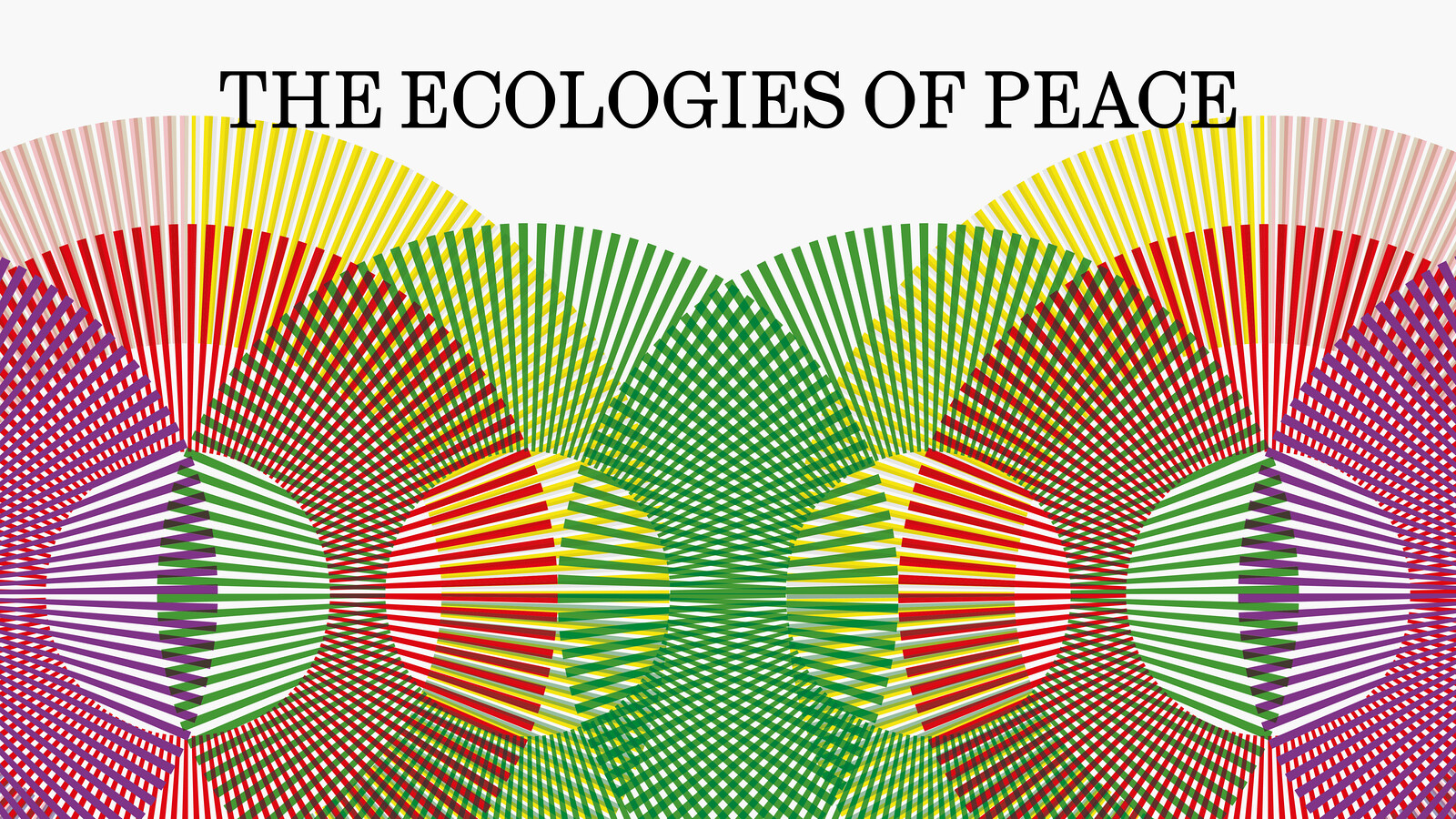April 26, 2024–March 30, 2025
Carmen Olmedo Checa
14009 Córdoba
Spain
An exhibition co-organized by TBA21 Thyssen-Bornemisza Art Contemporary and C3A Centro de Creación Contemporánea de Andalucía.
Curated by Daniela Zyman.
Amid loss, mourning, and the ravages of war, the yearning for peace becomes ever more urgent. And yet, peace, once a beacon of hope alongside freedom, sovereignty, and democracy, now finds itself ensnared in a web of contested ideas and polarizing demands. The Ecologies of Peace frames peacefulness beyond the binary of war and peace to take note of the interrelations and dis/continuities that emerge at a collective moment of rethinking the world. The exhibition highlights alternative approaches through which to cultivate peaceful relations by considering the profound interplay of peacebuilding with restorative, abolitionist, epistemological, and ecological justice. By disentangling peace from “war,” that is its traditional association with “hot” inter- and intrastate armed conflict, and instead recognizing war as encompassing colonial subjugation; occupation; the creation of segregated enclaves, where marginalized communities are confined; the militarized imposition of force during civil protests; gender-based violence; and violent extractive practices leading to ecocide, The Ecologies of Peace attempts to offer a deeper understanding of the transformational work of peace. This perspective suggests that peace does not only entail an end to warfare, but also attending to and devoting social and individual practices to addressing, reconciling, and repairing the losses, injuries, and wounds that haunt both postconflict and preconflict societies.
The Ecologies of Peace juxtaposes artworks that highlight the ways in which peace, freedom, and democracy are shaped by the realities of war and the industrial military complex with works that assert the unacceptability of such conditions. The exhibition gives visibility to practices of opposition and resistance to the order-making use of force and repressive power and to transformational efforts that reshape the boundaries of political action and praxis. Finally, it underscores the potential of art as a vehicle for reinvention, remediation, and solidarity, directed at the restoration of broken relations among humans as well as with the planet. Through their intersectionalist, situated, and trans-environmentalist perspectives, the artists in the exhibition contribute to destabilizing the deeply rooted acceptance of war and violence and to unweaving hegemonic narratives that shape collective consciousness and worldviews.
The Ecologies of Peace interweaves several pressing constellations of “unpeace” in our time. It delves into the protracted military engagement in Ukraine, explores the enduring aftermath of colonialism, racism, and the carceral system, exposes the effects of patriarchal orders, and navigates the complex histories of conflict in the Middle East, which form the backdrop to the virulent eruption of war in October 2023. Furthermore, it scrutinizes the intricate topography of (future) conflicts driven by the addiction to fossil fuels, resource extractivism, and compounding environmental catastrophes. Within these conflict-ridden scenarios, the exhibition foregrounds a rich repertoire of investigative methodologies from the applied tools of counter-forensics, situated witnessing, and the meticulous archiving of the war machinery to the evocative power of storytelling, philosophical speculation, and prefigurative politics.
In the face of a host of global, interwoven, and increasingly complex crises, The Ecologies of Peace raises profound questions about the ethical, ecological, economic, conceptual, and aesthetic norms and practices, both individual and collective, that are at play when describing and reshaping human agency. For whatever the dilemmas wrought from thinking about peace, they indicate that peacefulness is an unending transformational query and a “traveling” idea, marked by the myriad stations, communities, and realities through which it passes.
The Ecologies of Peace presents works from the TBA21 Collection and new commissions, including artists Lawrence Abu Hamdan, John Akomfrah, Allora & Calzadilla, Lucas Arruda, Mirna Bamieh, Fiona Banner, Neïl Beloufa, Monica Bonvicini, Candice Breitz, Janet Cardiff, The Center for Spatial Technologies supported by Forensic Architecture, Manthia Diawara, Ryan Gander, Cristina Garrido, Ayrson Heráclito, Jenny Holzer, Marine Hugonnier, Saodat Ismailova, Sanja Iveković, Nikita Kadan, Samson Kambalu, Amar Kanwar, Armin Linke, Cristina Lucas, Goshka Macuga, Pavlo Makov, Ursula Mayer, Joiri Minaya, Olaf Nicolai, Daniel Otero Torres, Jasbir Puar and Dima Srouji, The Propeller Group, Walid Raad/The Atlas Group, Lisa Rave, Rachel Rose, Lorenzo Sandoval, Ritu Sarin & Tenzing Sonam, Allan Sekula, Vivian Suter, Sissel Tolaas, Suzanne Treister, Álvaro Urbano and Akram Zaatari.
Opening program
Friday, April 26
6–7pm: The Ecologies of Peace opening
7–8pm: The Ecologies of Peace and War, keynote speech by the Spanish Journalist Olga Rodríguez
9–10pm: Tres golpes_redux, performance by the flamenco artist Perrate with Paco de Amparo
Saturday, April 27
11am–1pm: Bitter Things: The Workshop by Mirna Bamieh
1–2pm: The Meandering book, presentation with Sofia Lemos, Markus Reymann, Jesús Alcaide (Córdoba), Victoria García Gómez (Córdoba), Carmen Pérez Cuello (Córdoba)
5–7:30pm: Towards the world we want. Reflections on peace, conversation with Cristina Lucas and Marina Avia Estrada; Candice Breitz with Daniela Zyman; Fiona Banner, Maksym Rokmaniko and Marina Otero Verzier
9–9:30pm: To the Hands, by the Brouwer Choir
Find out more about TBA21’s program at tba21.org



